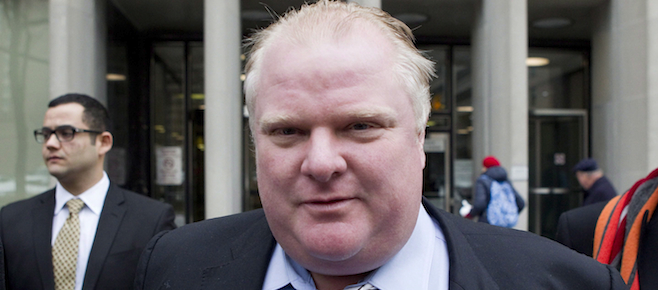Is Rob Ford just too honest?
The re-election campaign, should it be required, starts with a lawyer’s argument about the mayor’s character
Toronto Mayor Rob Ford leaves a courtroom on Monday January 7, 2013 during a break in proceedings as he appeals against an earlier decision to remove him from office. THE CANADIAN PRESS/Chris Young
Share

Another month, another day in court with Rob Ford. His whole mayoralty has been very edifying for the City Hall press corps in this regard. Once every month or so, off everybody troupes to some stately courtroom, mayor in tow, to watch him sit glumly in the front row as lawyers argue about this thing or that thing that Rob Ford has done. This was his third court session. Really, it’s a field trip for everybody.
Yesterday, the Toronto mayor’s appeal of the decision that kicked him out of office was heard in front of a divisional court. The day after, he is still mayor, and will be until the court decides on his appeal, which it promised to do as quickly as it can. Going in, the punditariat had predicted a rehash of the conflict-of-interest trial that rendered a damning verdict against him. What we got instead was a launch few were expecting–the debut of Rob Ford: Honest Man.
The mayor was kicked out of office for breaching Ontario’s strict conflict-of-interest laws by speaking out in council against having to repay a few thousand dollars in donations to his football charity. (The money had been solicited in ways that broke the city’s integrity rules.) Then, to make matters worse, he voted against giving the money back. His political foes saw an opportunity and sued. A trial followed in October and once Justice Charles Hackland found that Ford has indeed broken the provincial Conflict of Interest Act, the penalty was automatic and written into law: removal from office.
In court this week, Ford’s team had to demonstrate that Hackland had made errors in his ruling. This is a tall order. Ford’s lawyer–the spry, venerable Alan Lenczner–did have one big advantage: The mayor himself was not speaking this time; his extraordinarily single-minded performance on the stand in the last trial did not advance his case at all.
Many of the arguments were as arcane as you could hope. (How many high-school football players can dance on the head of a pin?) For hours, Ford’s team tried to prove that, contrary to the original ruling, Toronto’s council overstepped its authority when it penalized Ford for his football-charity solicitations. This argument variously had Ford’s lawyer discussing pesticide spraying in Quebec and the legal status of a pile of dirt in British Columbia. On and on it went.
But then Lenczner did something unexpected. At the first trial, Lenczner stuck mostly to the law. This week, however, he launched into a defence of Ford’s character so broad and so media-friendly, it wouldn’t have seemed out of place on the Ford brothers’ bombastic radio show. Trying to discredit the ruling that Ford hadn’t made his conflict-of-error in good faith, Lenczner pronounced that Ford’s decision to get up in council and decry the decision to have him repay the money wasn’t belligerence, but rather a token of his straightforwardness in self-defence.
“He made no bones about it,” said Lenczner, growing much more animated than he was when discussing the pile of dirt. “He got up and spoke to it. He was perfectly plain and honest. This is the hallmark of an honest man!”
After playing a video of Ford blustering through his speech at council, his lawyer returned to the theme.
“Is that the demeanour of someone who is trying to hide something, or is it the demeanour of an honest man?” By now, he was practically hopping about behind his lectern in agitation. “And do we want to throw out a mayor who was elected by the people because he voted on one occasion?” And later still: “It’s not as though he was being belligerent! It’s not as if he was being obstinate!”
Technically speaking, there are problems with pinning a defence on Rob Ford’s honesty, starting with the fact that he’s been caught in several very public lies, like the times he denied being ejected from the Air Canada Centre or arrested in Florida, before being caught out. What’s more, arguing that his willingness to plunge into a blatant conflict-of-interest is a token of his worthiness is a particularly bold move.
But the “It’s not a bug, it’s a feature!” defence is exactly how the public is predisposed to see this case. The moral core of this case is what the public will be deciding on, should it come to them. Ford may not be a compulsive truth-teller, but he does have the benefit of genuinely held convictions, which is an honesty of sorts. He is a very consistent man: consistent in outlook, consistent in values, consistent in the wild inconsistencies he needs to promote his values (Save money, but build subways at any cost! Avoid waste, but waste money to cancel things!). People get simplicity and honesty mixed up all the time.
It was as if Lenczner was arguing the case in two courts at once: One for the panel of three judges hearing the case at the moment and one for the court of public opinion, which will take the case up if Ford loses his job. The court may or may not buy the argument; prognostications about the verdict rely on the mug’s game of reading into the judges’ facial expressions and mercurial questions. But if the result is not in Ford’s favour, and he has to pitch for his job again, the stage is set. The last honest politician? How very appealing.